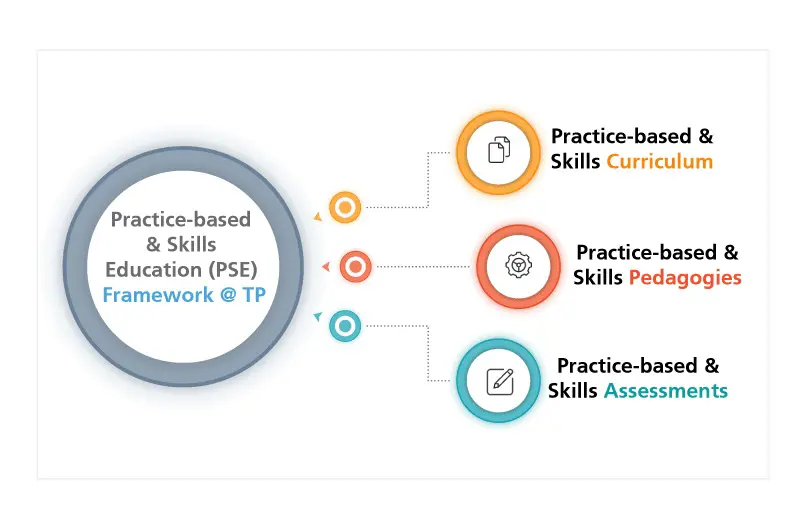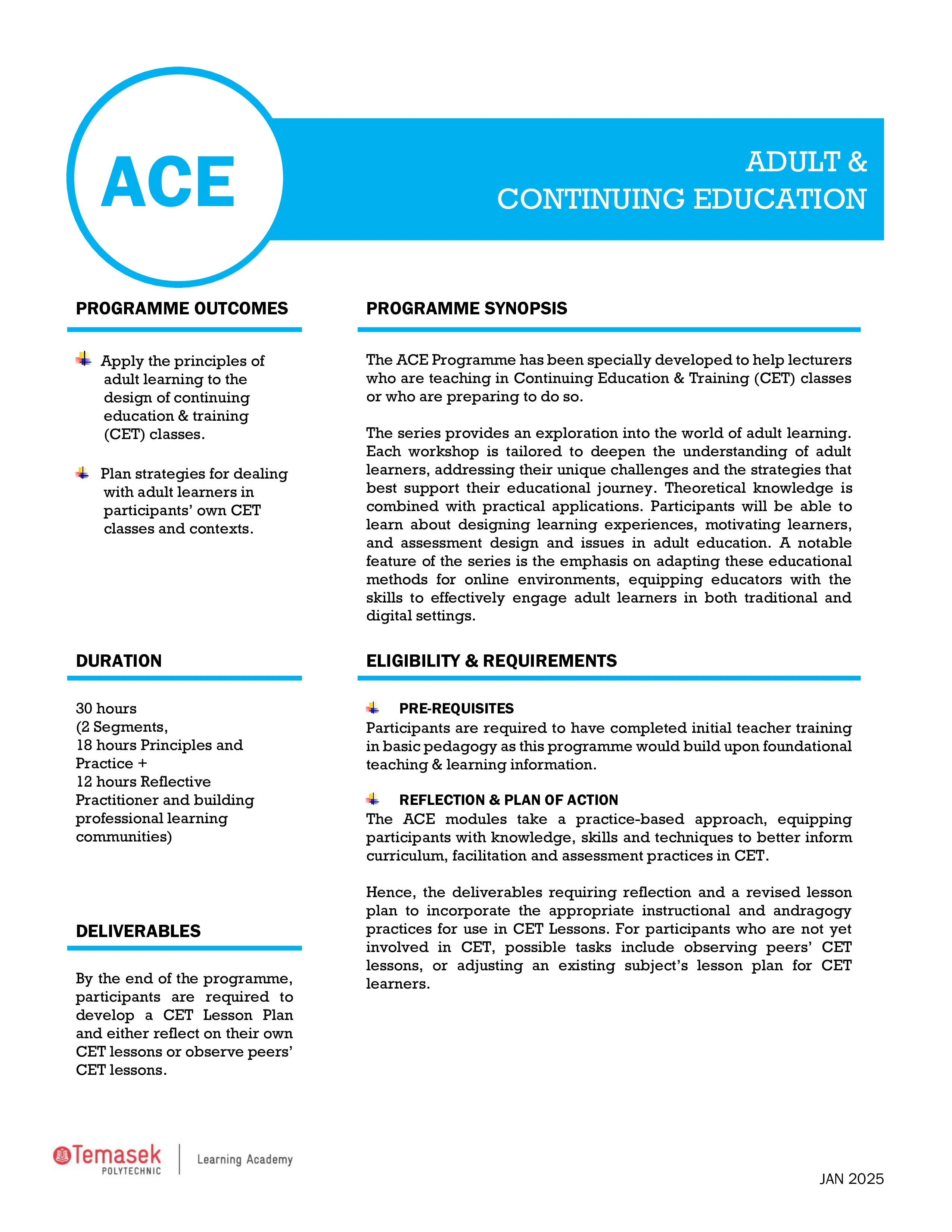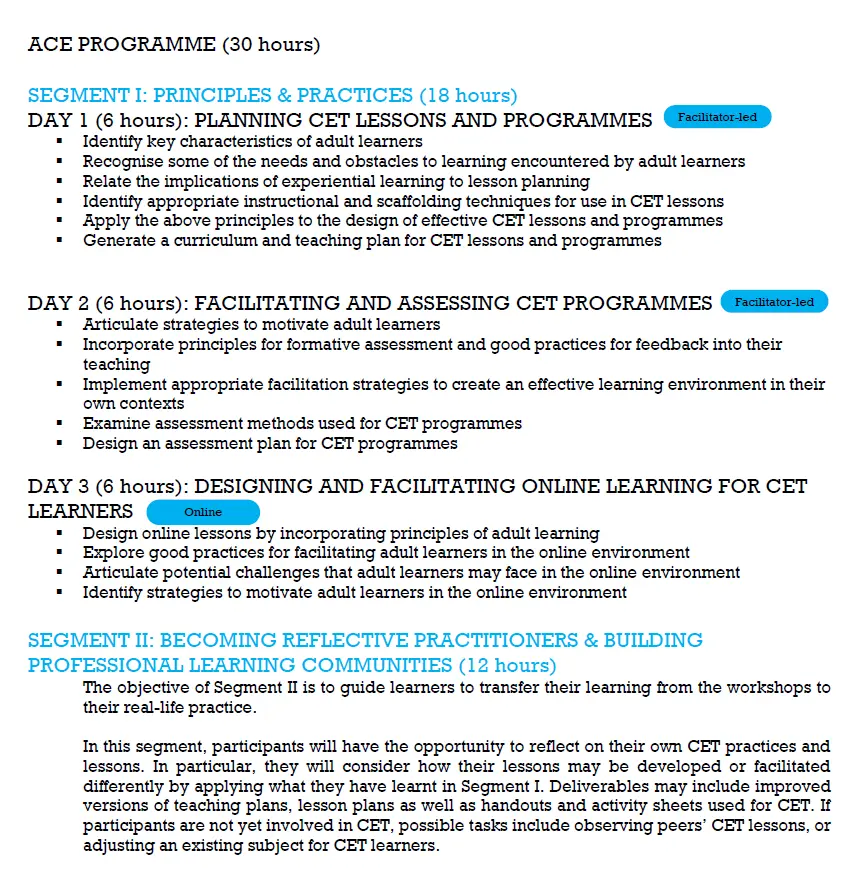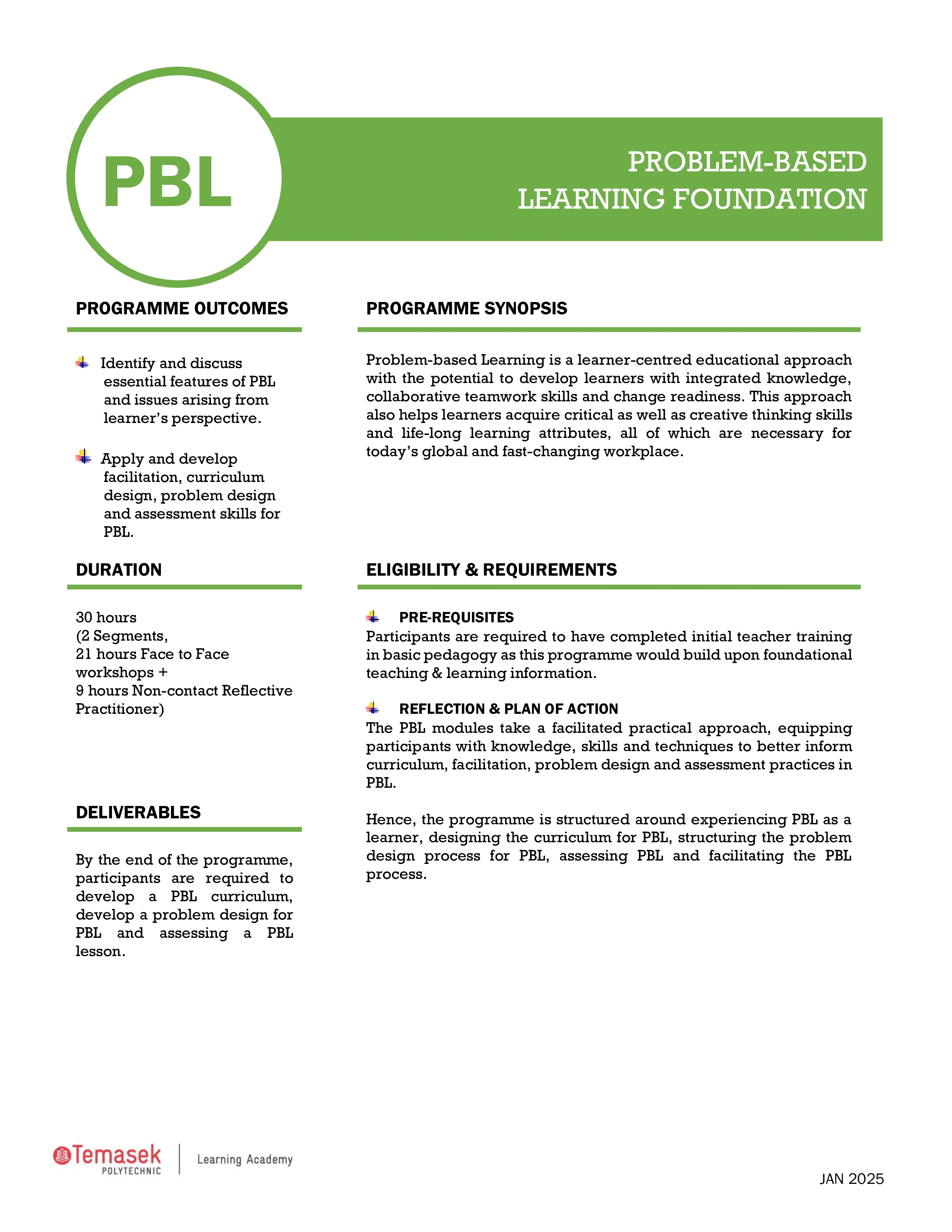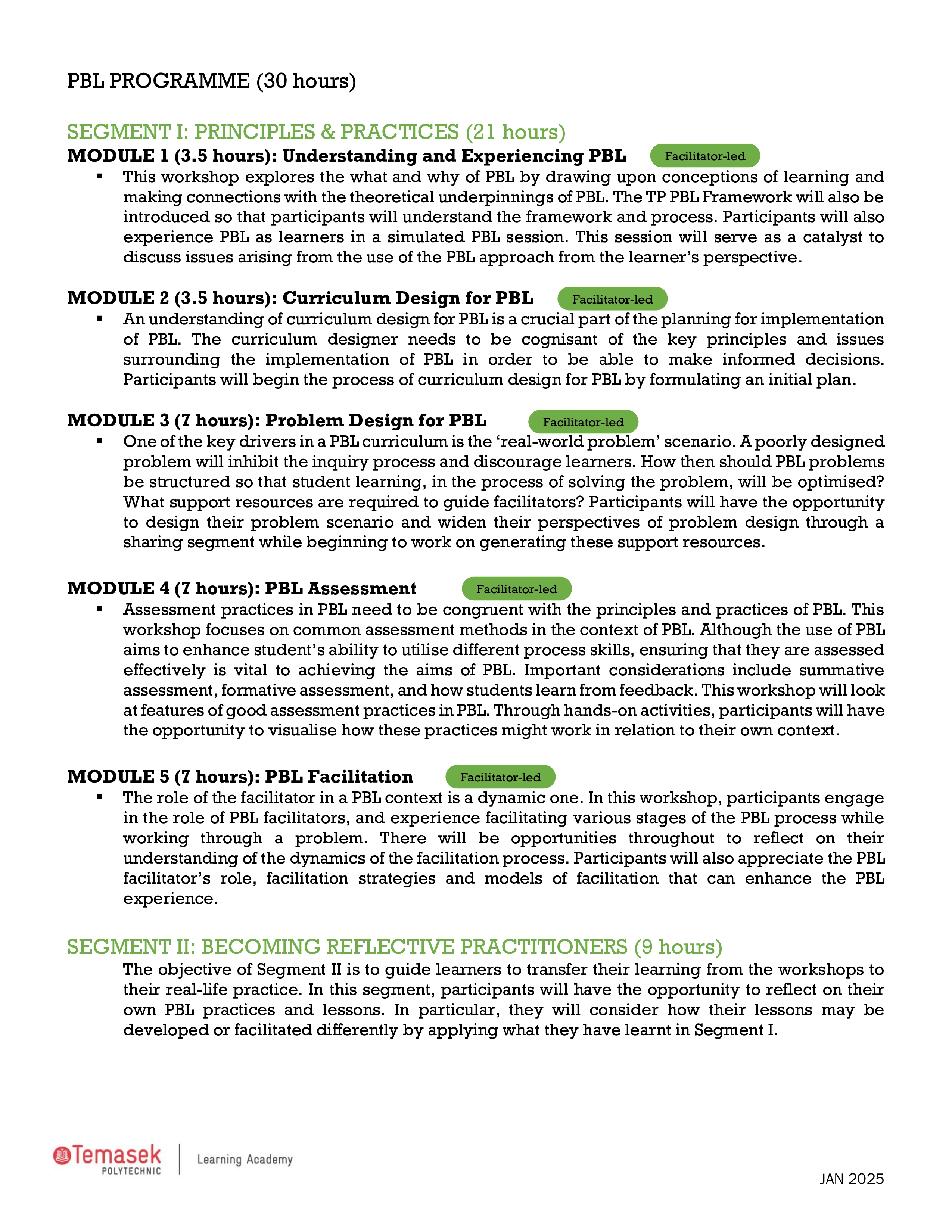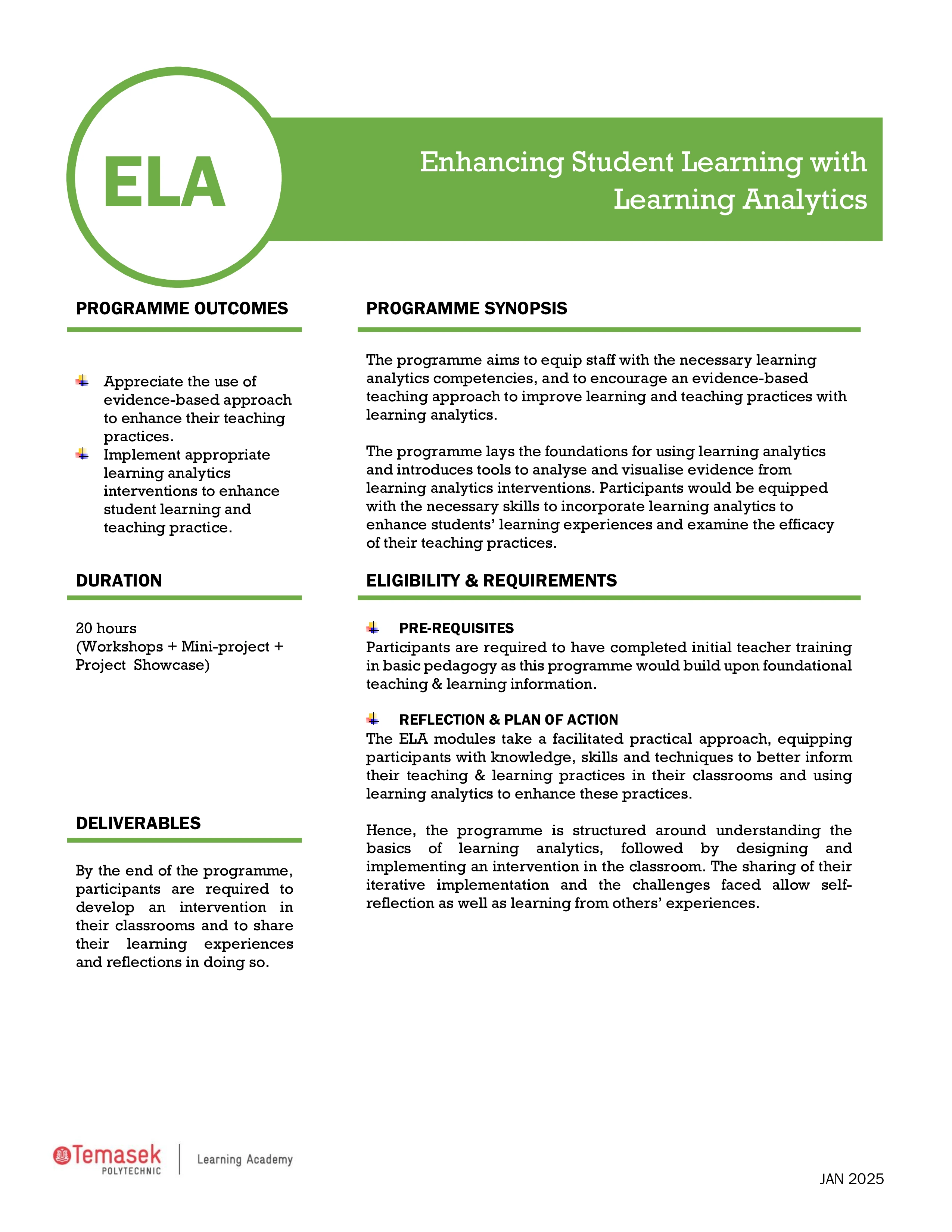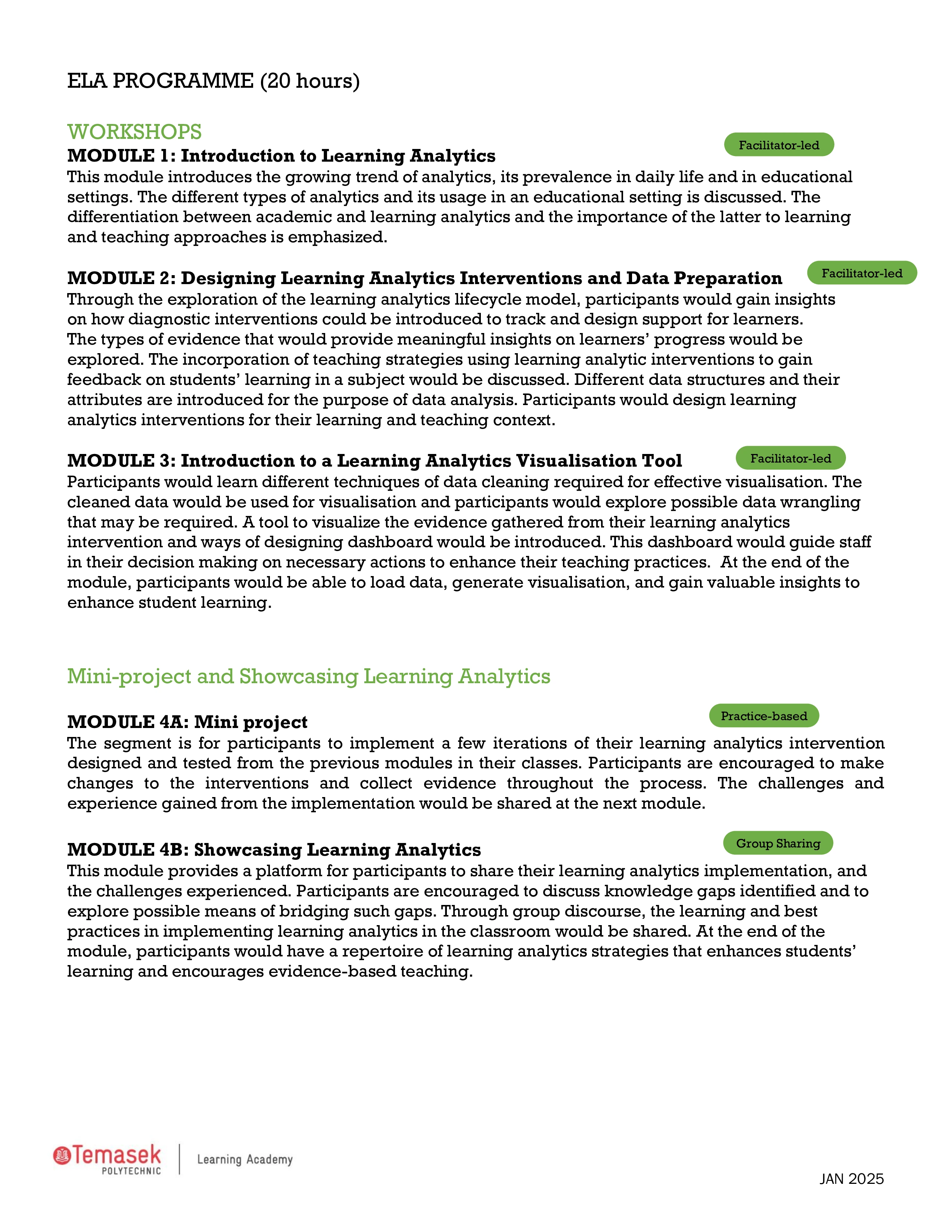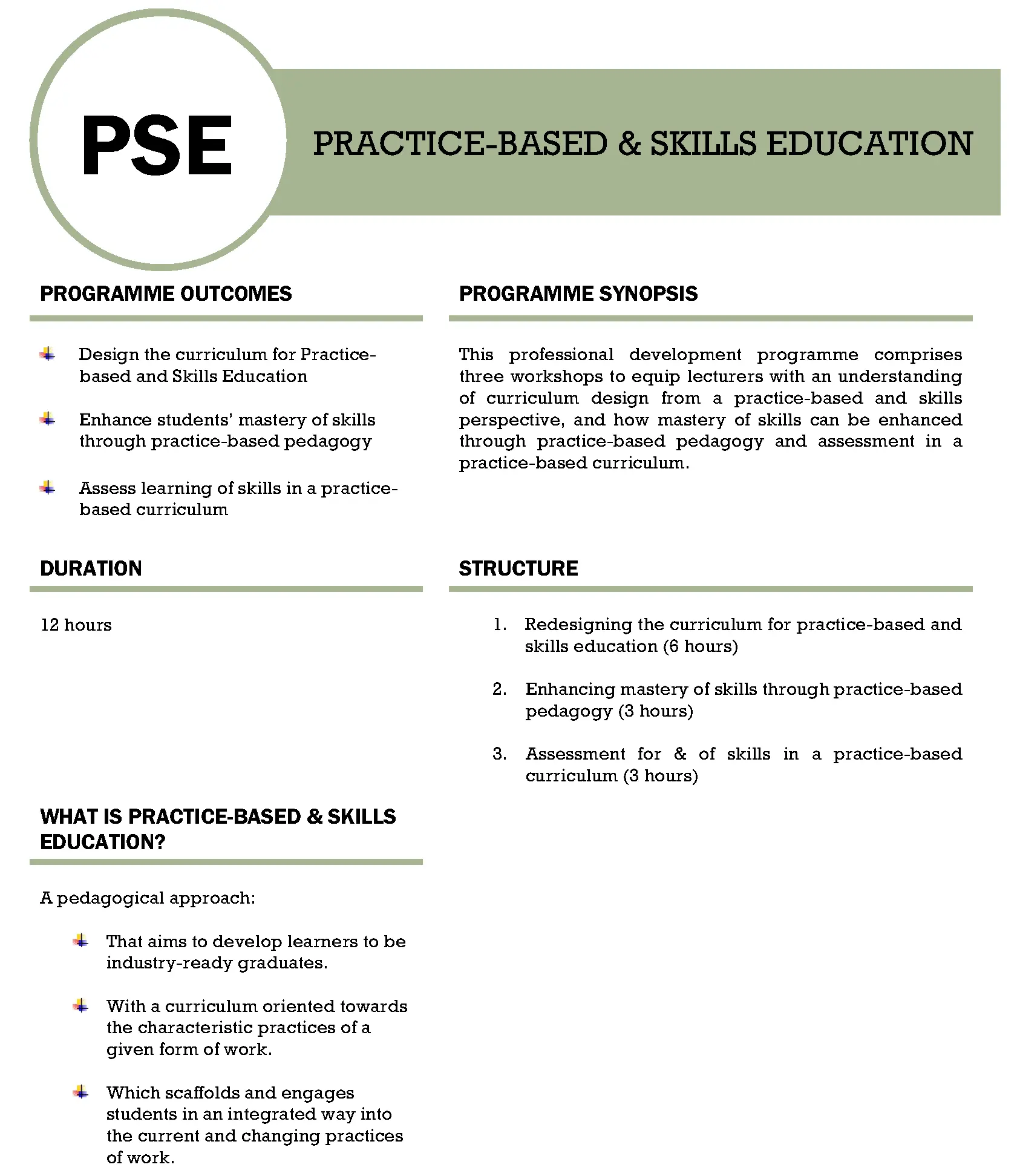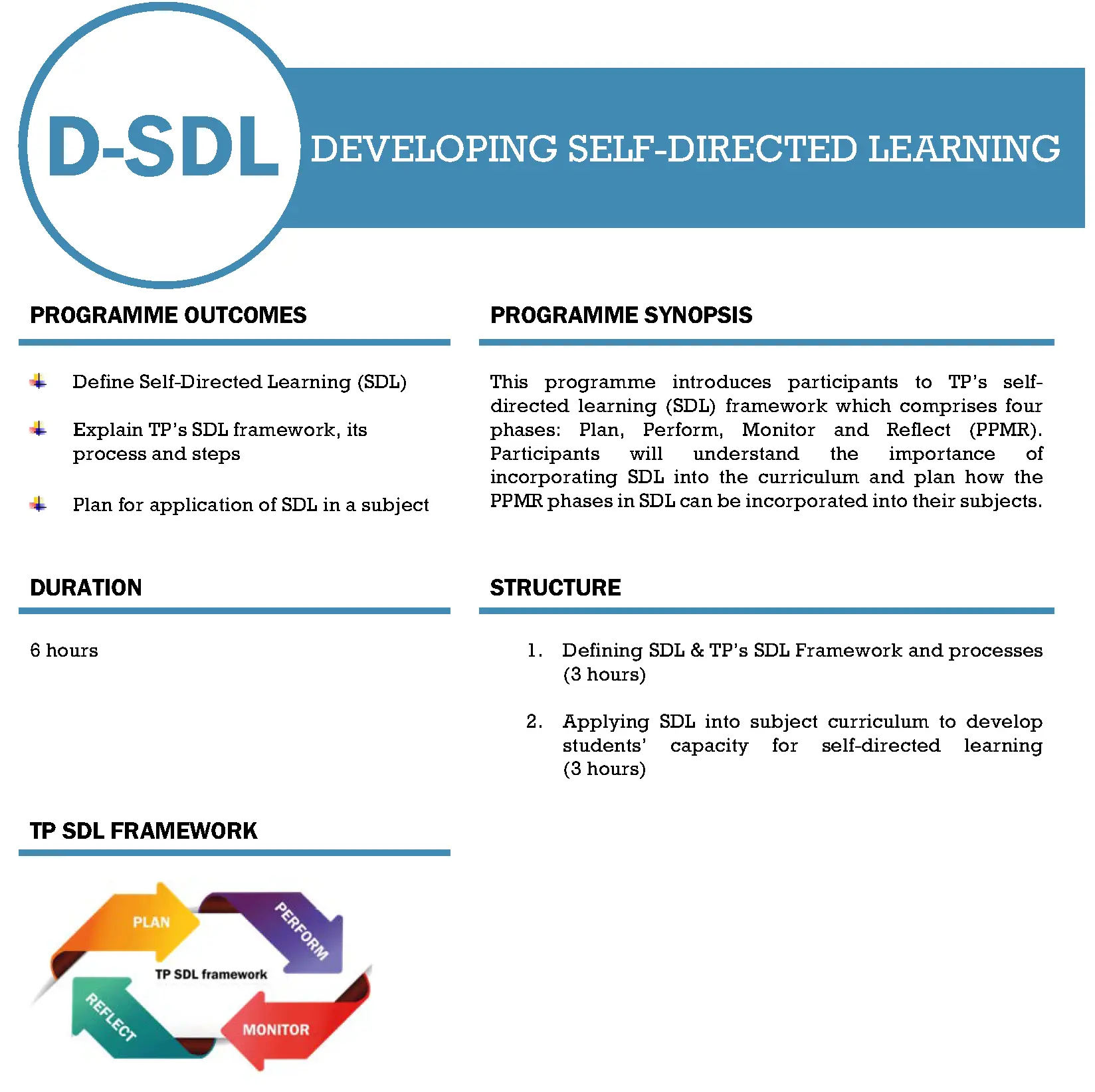TP adopts a Practice-based & Skills Education (PSE) Framework that deepens the focus on providing authentic learning to prepare learners for and in the working world. With curriculum, pedagogical and assessment practices aligned with industry needs, in collaboration with industry partners and simulated and real-world environments, students can apply their learning to the real-world. Equipped with the skills, knowledge and values of the profession, the students are ready to embrace the challenges of the working world.
Overview
The Learning Academy is committed to the development of staff capabilities.
We aim to support TP's teaching staff in providing learning experiences that prepare learners for and within the industry. We assist the diploma teams to adopt relevant TP frameworks as well as good teaching and learning practices.
The Learning Academy also develops and conducts professional development programmes for TP’s staff in areas such as learning-teaching, the use of technology for learning, including e-learning, and learning analytics. We provide opportunities for continuing professional development by guiding teaching staff in their teaching journey and learning from each other in professional learning communities. We also support TP’s polytechnic-wide initiatives in areas such as data-enabled learning and personalised learning.
In addition, the Learning Academy researches the efficacy of initiatives on students’ learning in areas such as self-directed learning, problem-based learning, technology-enhanced learning, and learning analytics.
The Learning Academy engages in external e-learning and microlearning consultancy and development projects for and with corporations and clients from the private sector and government agencies. We work closely with the other polytechnics in a variety of areas, including strategic discussions on pedagogy for the sector, developing curriculum and delivering programmes for joint-polytechnic courses, as well as courseware for learning in the Joint Polytechnic Learning Management System.
Temasek Polytechnic’s Pedagogy
Temasek Polytechnic’s Practice-based and Skills Education (PSE) Framework
TP adopts a Practice-based and Skills Education (PSE) Framework that deepens the focus on providing authentic learning to prepare learners for and in the working world. With curriculum, pedagogical and assessment practices aligned with industry needs, in collaboration with industry partners and simulated and real-world environments, students can apply their learning to the real-world. Equipped with the skills, knowledge and values of the profession, the students are ready to embrace the challenges of the working world.
Pedagogies @ TP
Temasek Polytechnic Graduates
- Every TP graduate is equipped with the skills, knowledge and attitudes that are required at the workplace, so that they are ready for the challenges of the industry.
- TP also aims for their graduates to be lifelong learners, future-oriented creator and values-centred leaders. These attributes are cultivated through a suite of subjects at Teamsek Polytechnic fondly called “TPFun” (Or TP Fundamentals)
TP offers a wide range of learning experiences and activities, using a variety of pedagogies, to achieve these aims. Two of TP’s important frameworks are the Practice-based & Skills Education (PSE) Framework, and the Self-directed Learning (SDL) Framework, as well as Problem-based Learning. Elearning and digitisation are also important parts of the TP brand of education.
TP students should be lifelong learners, who remain competent in the face of challenges and rapid changes. TP has implemented a framework for self-directed learning (SDL) to develop students with self-directed learning capacity; this will be incorporated into TP students’ 3 years of study.
Self-Directed Learning (SDL) is a process in which individuals take the initiative, with or without the help of others, to diagnose their learning needs, formulate learning goals, identify resources for learning, select and implement learning strategies and evaluate learning outcomes.
TP's Self-Directed Learning Framework comprises the four phases: Plan, Perform, Monitor and Reflect (PPMR).
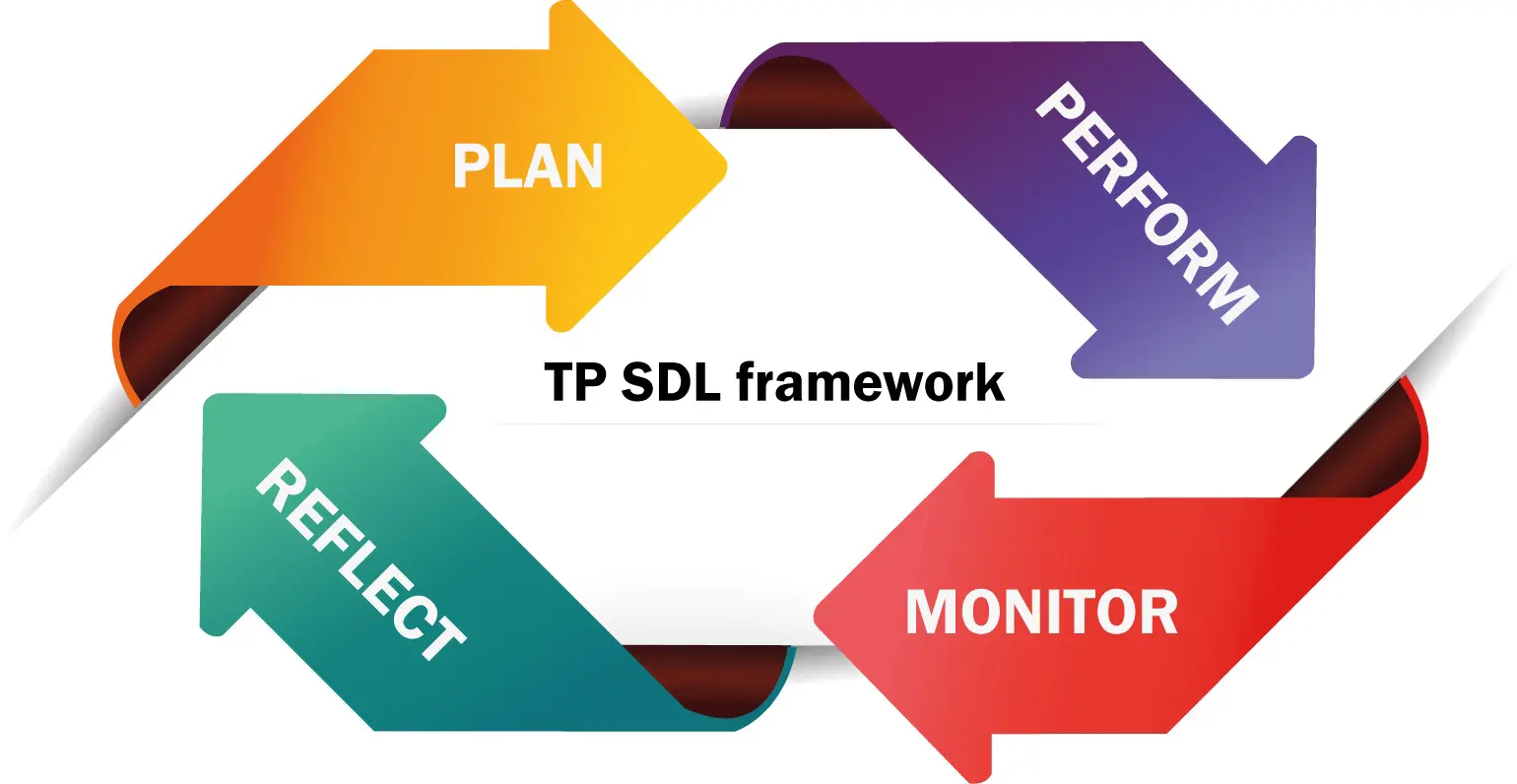
- The Plan stage involves students in analysing the learning task and formulating a plan to complete the task.
- The Perform stage involves the process of maintaining concentration and interest through the use of strategies as students work on the learning task.
- The Monitor stage enables students to judge their tasks and formulate reasons for their results.
- The Reflect stage supports students in building a clear understanding of the adequacy and quality of their work.
The PPMR process is not linear, and can be deployed as a cyclical process or iterated in as many permutations that suit the design of the subject.
Problem-based Learning (PBL) is a learner-centred educational approach with the potential to develop learners with integrated knowledge, collaborative teamwork skills and change readiness. This approach also helps learners acquire critical as well as creative thinking skills and life-long learning attributes.
At TP, PBL is used as a curriculum approach at the subject level. Learners would work their way through an ill-structured programme both as a a stimulus for learning and a focus for organising what has been learned for later recall and application to future work.
In the process, students are guided by the TP PBL framework comprising:
- The TP PBL Essentials (The philosophical underpinnings of PBL)
- The TP 7 –stage PBL Process (the different learning stages), and
- The thinking tool of a FILA chart (comprsing of Facts, Ideas, Learning Issuesa and Action Plans)

As one of TP’s key pedagogies, e-learning permeates all aspects of learning and teaching. It may take the form of wholly e-learning sessions, blended learning or flipped classrooms.
TP’s e3 framework leverages on the use of digital technologies that not only provides learning on demand, anytime and anywhere, but also many opportunities for collaborative learning beyond the classroom. TP’s aim in expanding online learning opportunities for students is to develop in them a spirit of lifelong learning.
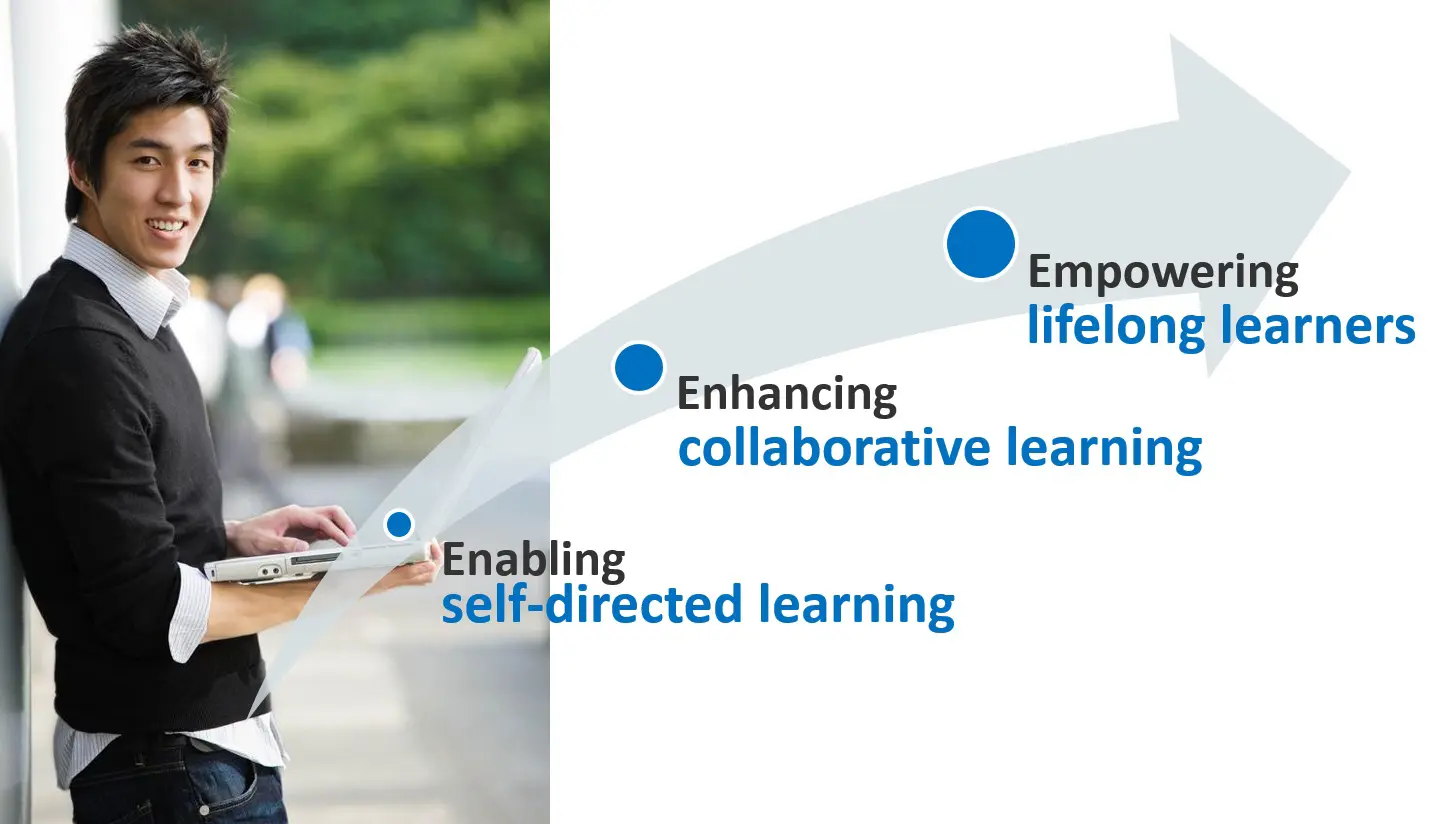
In the area of e-learning, the Learning Academy aims to enhance the skills of academic staff to integrate information and communication technology into learning and teaching contexts.
Learning Academy provides professional development for staff using the Learning Management System in TP, develops e-learning materials in collaboration with staff, and encourages best practices in e-learning and interactive digital media.
TP utilises the 5E model in relation to flipped learning.
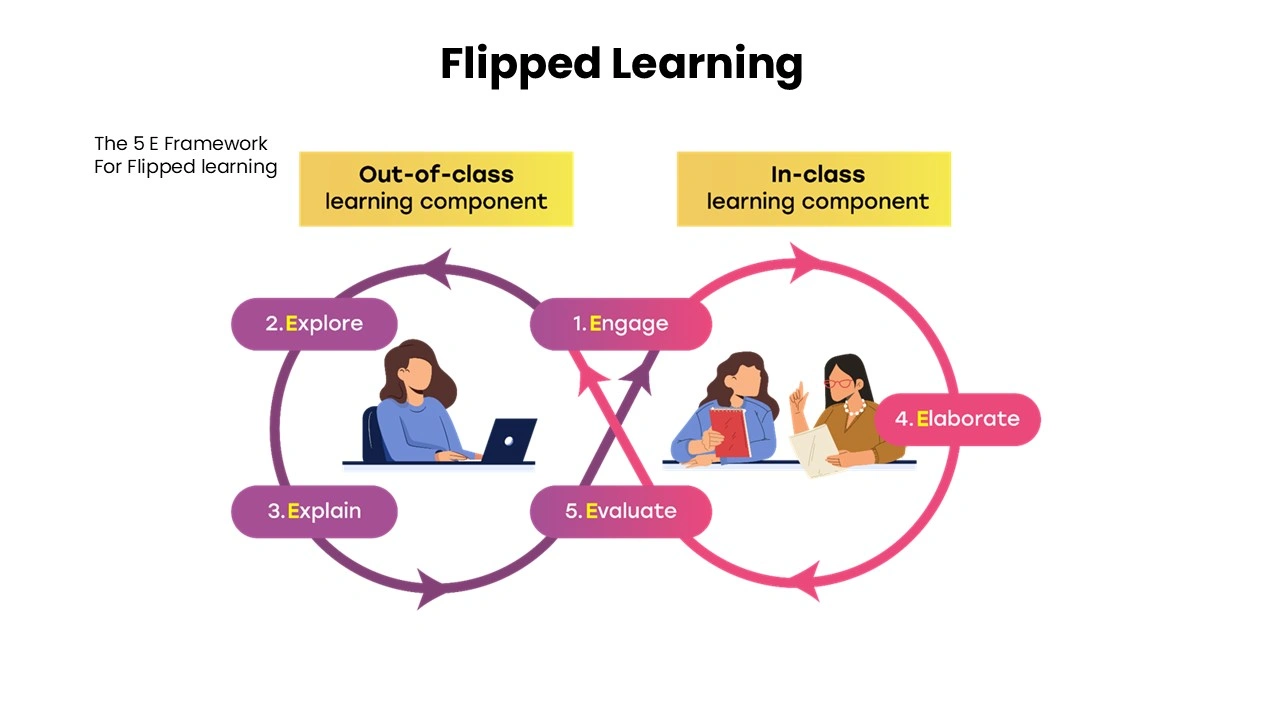
Learning Academy provides professional development for staff using the Learning Management System in TP, develops e-learning materials in collaboration with staff, and encourages best practices in e-learning and interactive digital media.
Temasek Polytechnic believes that students would need to go beyond their own disciplineary knowledge and skills to understand other disciplines, and to synthesise and integrate these, into a unified or coherent knowledge framework. This is needed for our graduates to work seamlessly in interdisciplinary teams. Students should be able to display problem solving and critical thinking, as well as communicate and collaboration in such environments. This would allow them to handle more complex problems, and to adjust to a variety of job roles.
TP’s desired learning outcomes under this framework is for students to:
1. Integrate and synthesise knowledge from different disciplines
2. Apply Problem Solving & Critical Thinking Skills
3. Engage in Multidisciplinary Communication & Collaboration, and
4. Demonstrate an Agile Mindset
Over the three years, TP students will be exposed to IDL. They will begin with appreciating IDL, then moving on to applying IDL and integrating and synthesising two or more disciplinary bodies of knowledge.
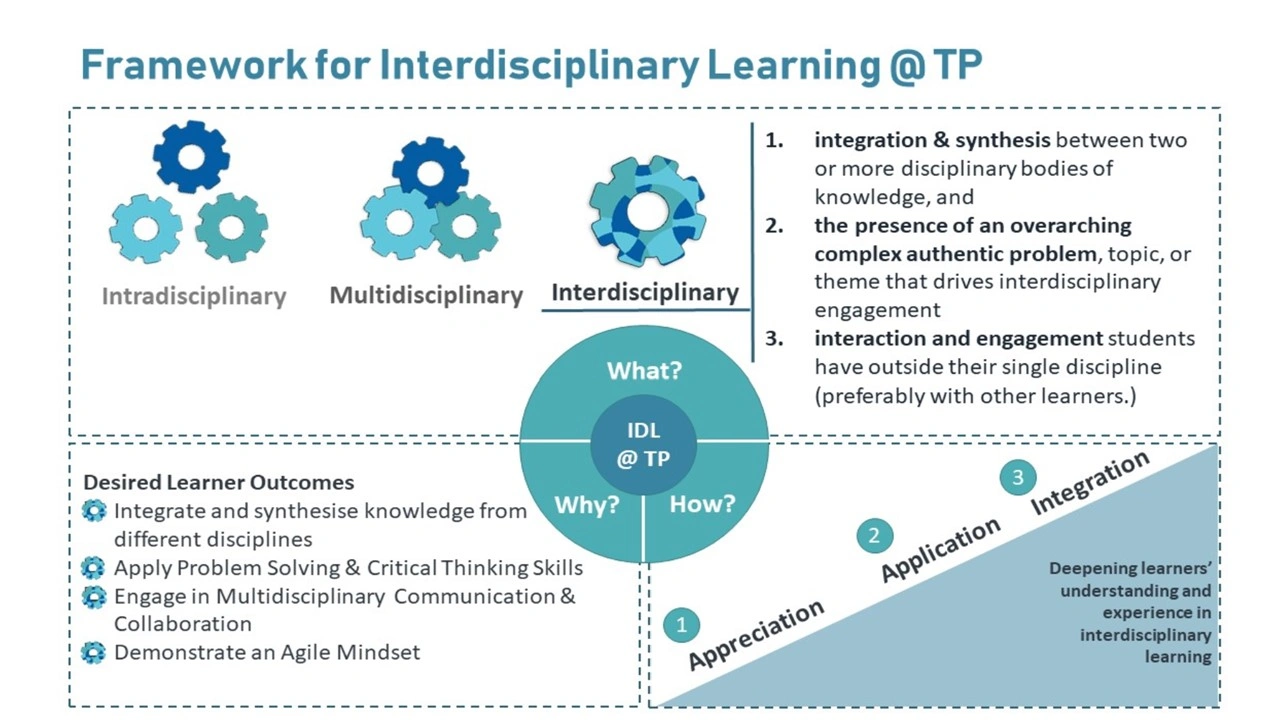
Essential criteria for Interdisciplinary Learning @ TP
1. integration & synthesis between two or more disciplinary bodies of knowledge,
2. the presence of an overarching complex authentic problem, topic, or theme that drives interdisciplinary engagement
3. interaction and engagement students have outside their single discipline (preferably with other learners.)
TP implements this framework at a polytechnic level, where different Schools or different Diplomas in a School work together at the curriculum and subject planning.

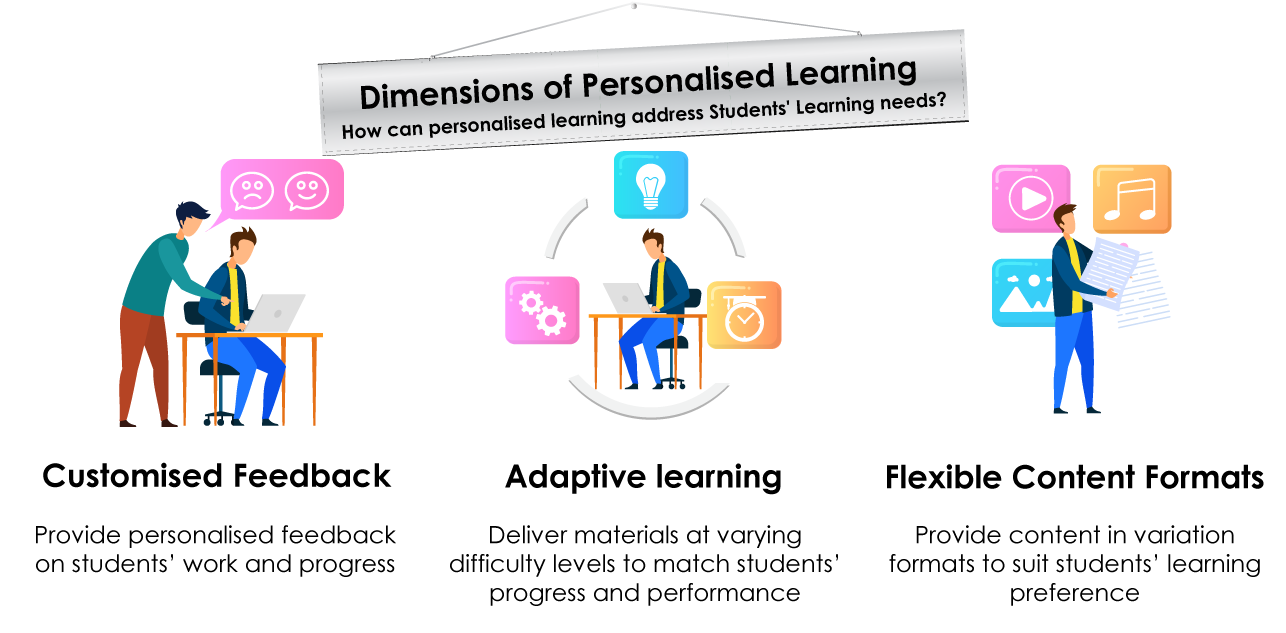
Project Showcases
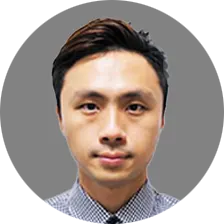
"I hope personalised learning transforms education by making it more student-centered and equitable. Ideally, this approach will help bridge the gap for students who have been underserved by traditional models. On a broader level, I hope it fosters a culture of lifelong learning, where students are more engaged, self-motivated, and better prepared for the evolving demands of the future workforce."
On the motivation for personalised learning …
My motivation for personalising learning is to enhance CET student engagement by catering to individual learning styles, needs and pace. By making it personalised, I hope it can help them to take ownership of their learning by providing the necessary resources for them to check their learning progress and understanding of the topic.
On the challenges faced that prompted the shift towards personalisation …
The challenge I faced was the diverse background and profile of the CET students and their pace of learning was varied. It became evident that a one-size-fits-all approach was not effective in optimising learning for individual students.
On starting the endeavor of personalising learning …
I began by curating modules using LeaP, which is a built-in feature in Brightspace LMS. I focused on the challenging topics in the subject and provide students with content and practice questions of varying difficult levels so that it can adapt to their learning progress.
On the strategies adopted to facilitate personalised learning …
I implemented a blended learning approach where students watch pre-recorded videos on a topic and assess their understanding through the LeaP modules. With LeaP, each student is provided a personalised learning path that tailors to their needs.
On the impact of personalised learning on students’ experience…
I have observed that the personalisation has helped to address the learning gaps more effectively. Furthermore, my students commented that they felt empowered and motivated to learn as they have greater control over their pace of learning. The learning experience was positive.
The key takeaways from implementing personalised learning …
The importance of providing continuous feedback and maintaining flexibility and customisation in teaching. Fortunately, EdTech has enabled me to achieve these goals effectively.
My advice to others on implementing personalised learning …
Start small by piloting with a few key topics and implementing it in phases. It is important to ensure that learning modules integrate smoothly with your teaching style and delivery method, and not force fit it. Additionally, instructions should be as clear as possible, especially for CET students who may not be as confident when using EdTech to learn.
Hear what staff and students are saying about Brightspace LeaP

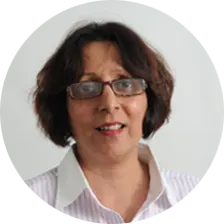
"Start small, leverage on technology to gather data and use the data to inform instruction and tailor learning pathways for individual students. Students could still seek formative feedback from their tutors, and their AI Speaker/Presenter Coach analytics reports to ask for ideas for improvement."
On the motivation for personalised learning …
I did this in a COVID environment to tailor the oral presentation delivery practice to meet students’ learning needs. This was to ensure that students can practice at their own pace to improve oral presentation delivery aspects that are difficult to grasp for better achievement and learning outcomes.
On the challenges faced that prompted the shift towards personalisation …
During the COVID pandemic when home-based learning was implemented, there was increased anxiety because students had to practise oral presentation delivery in aspects of presentation without consistent feedback from tutors in a face-to-face mode.
On starting the endeavor of personalising learning …
I read about personalisation and then identified the AL tool Microsoft’s Presenter Coach with LA colleague Boey Chee Kin’s introduction to it. I tried it to gather AI feedback on my own oral presentation delivery skills as part of my own webinar delivery practice before teaching it to the students in a demonstration, followed by practice. According to Hattie (2001), feedback is of one of the most powerful tools for improvement in student performance. Feedback is “information provided by an agent to a learner relating to their skills or understanding as demonstrated on a task or in the completion of a task, usually after instruction” (Hattie & Timperley, 2007).
On the strategies adopted to facilitate personalised learning …
I used John Hattie's "Visible Learning" framework (2009) where personalised learning is essentially about making learning "visible" to students, meaning they can clearly see their progress, understand their learning goals, and actively participate in the process of assessing their own oral presentation strengths and weaknesses via AI Presenter Coach feedback, allowing them to tailor their learning path based on their individual needs and strengths using the AI tool Presenter Coach for rehearsal.
On the impact of personalised learning on students’ experience…
I undertook research for three semesters with CET students and one semester with PET students on oral presentation. Students said that their skills in areas such as pace, intonation, use of filler words and pronunciation improved through the targeted feedback received and that they would even use it at work for workplace oral presentation.
The key takeaways from implementing personalised learning …
Start small (I did a pilot study, initially), gather data (AI Presenter Coach offers a report that provides data-driven insights on each practice session). Use formative assessment to track progress. Leverage on technology. Allow flexibility in progress. Students practised more times when they needed it and fewer times if they felt confident that they had mastered delivery aspects.
My advice to others on implementing personalised learning …
Collaboration:
Facilitate collaboration among students and teachers to support personalised learning goals and provide peer feedback. I used Feedback Fruits to allow students to give peer feedback in addition to the AI feedback received. Bring colleagues on board.
Data-driven decision making:
Use data from formative assessments to inform instruction. Tailor learning pathways for individual students. Students could still seek formative feedback from their tutors, and their AI Presenter Coach reports to ask for ideas for improvement.
Hear what staff and students are saying about Speaker/Presenter Coach

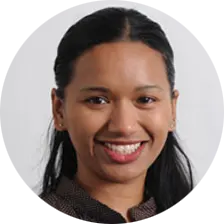
"I established automated nudges through Brightspace's Intelligent Agents that trigger based on specific student behaviours. Consider carefully what needs to be nudged to avoid students treating messages like spam and think about whether the messaging tone should be firm or encouraging."
On the motivation for personalised learning …
My primary motivation is to efficiently monitor student progress and remind students in large cohorts without the headache of manual tracking. Intelligent Agents provide customised emails to individual students rather than blanket announcements, creating personalisation at scale. So, we can create the impression of high-touch engagement while maintaining a manageable workload.
On the challenges faced that prompted the shift towards personalisation …
With TPFUN subjects having big cohorts, looking through the LMS to identify non-submissions and writing individual reminders was extremely time-consuming. Students often forgot about assignments or needed more active monitoring, which wasn't sustainable to provide manually.
On starting the endeavor of personalising learning …
I researched the Intelligent Agent features in Brightspace and explored various implementation possibilities. Before full deployment, I conducted practice runs to ensure the system worked as intended and delivered the right messaging.
On the strategies adopted to facilitate personalised learning …
I established automated nudges through Brightspace's Intelligent Agents that trigger based on specific student behaviours. To enhance effectiveness, I used Power Automate to forward these nudges to Microsoft Teams, where students were quick to acknowledge and respond to our messages.
On the impact of personalised learning on students’ experience…
The subject has seen very low non-submission rates for high-stakes assignments and far fewer last-minute submissions. Students receive targeted, personalised communications rather than generic announcements, increasing their responsiveness and accountability.
The key takeaways from implementing personalised learning …
The time-saving impact has been tremendous—in one semester alone, the team sent over 9,000 personalised nudges to approximately 2,600 students, which wouldn't be humanly possible manually. Strategic automation creates high-touch support while dramatically reducing staff workload.
My advice to others on implementing personalised learning …
Consider carefully what needs to be nudged to avoid students treating messages like spam, and think about whether the messaging tone should be firm or encouraging. Always start small and test the automated nudges with practice runs before full implementation to ensure they work as intended. This will give you the confidence to scale it up when needed.
Are there measurable outcomes (e.g., engagement, achievement) that demonstrate the effectiveness of personalised learning?
The data shows very low non-submission rates (0.63%) for high-stakes assignments and significantly reduced last-minute submissions. In one semester alone, the team delivered over 9,000 personalised nudges to approximately 2,600 students, with students quickly acknowledging and responding through MS Teams integration. The personalised nudges also motivated students to complete their e-learning activities – completion of activities increased by 63% when comparing between pre-nudge and post-nudge.
How did you feel about the transition to personalised learning? What challenges did you face?
The transition initially took time for me to learn the capabilities of Brightspace's Intelligent Agents and Power Automate. Testing the solution was also a challenge as I had to troubleshoot technical issues. However, this upfront challenge has led to improvements in reduced workload and improved student outcomes, making the initial learning curve worthwhile.
Hear what staff and students are saying about Intelligent Agents

Short courses:
Gen AI (as part of the Gen AI roadmap for TP staff)
TP has implemented a learning roadmap designed to build AI competencies for all TP staff in order to provide a practical foundation in AI and empower staff to integrate AI responsibly and effectively into our professional roles.
LA supports and facilitates this through a series of professional development workshops in using Gen AI tools to facilitate learning and assessment. Foundation online workshops for all TP staff are also offered.
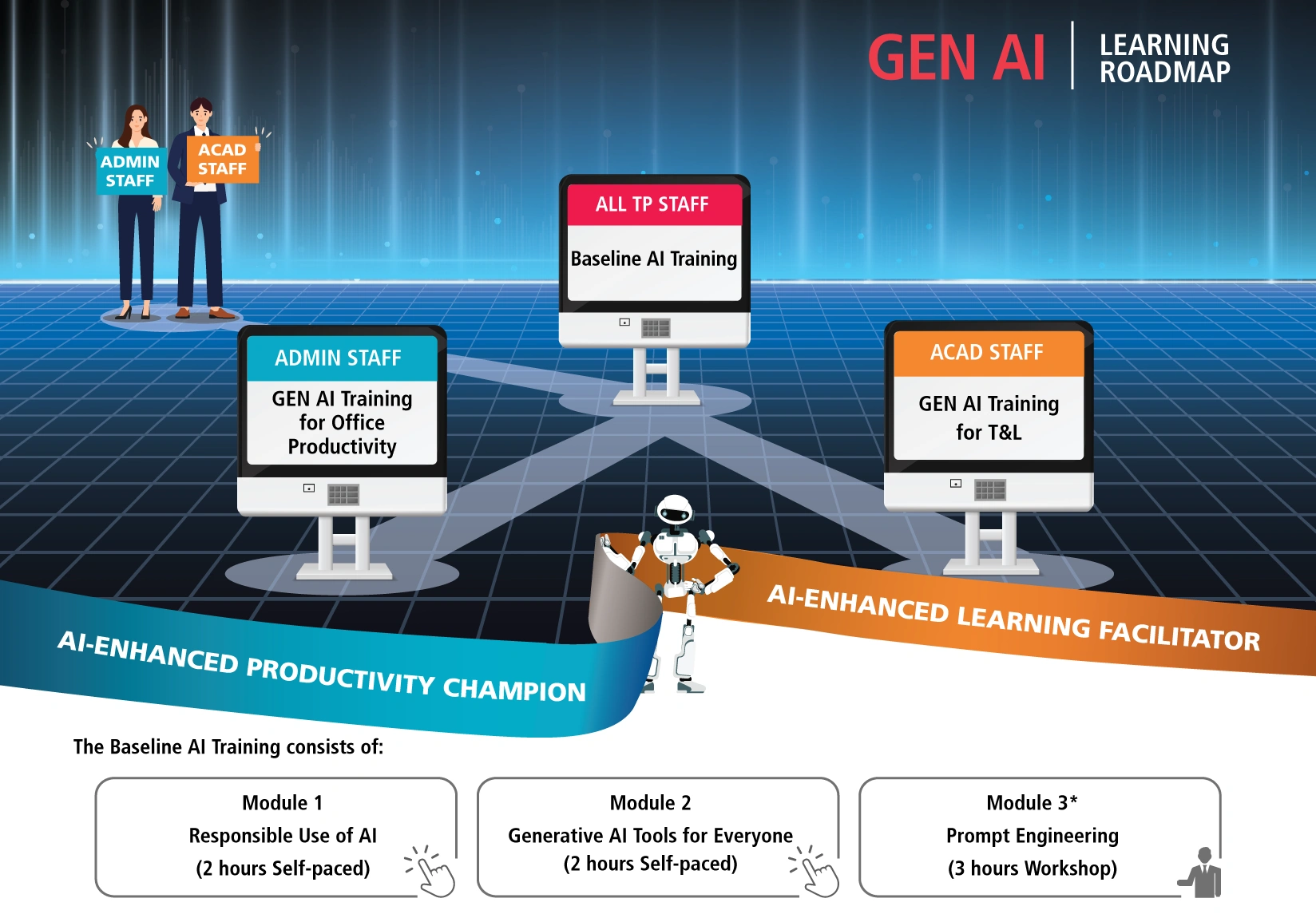
Examples of some of these workshops are found here.
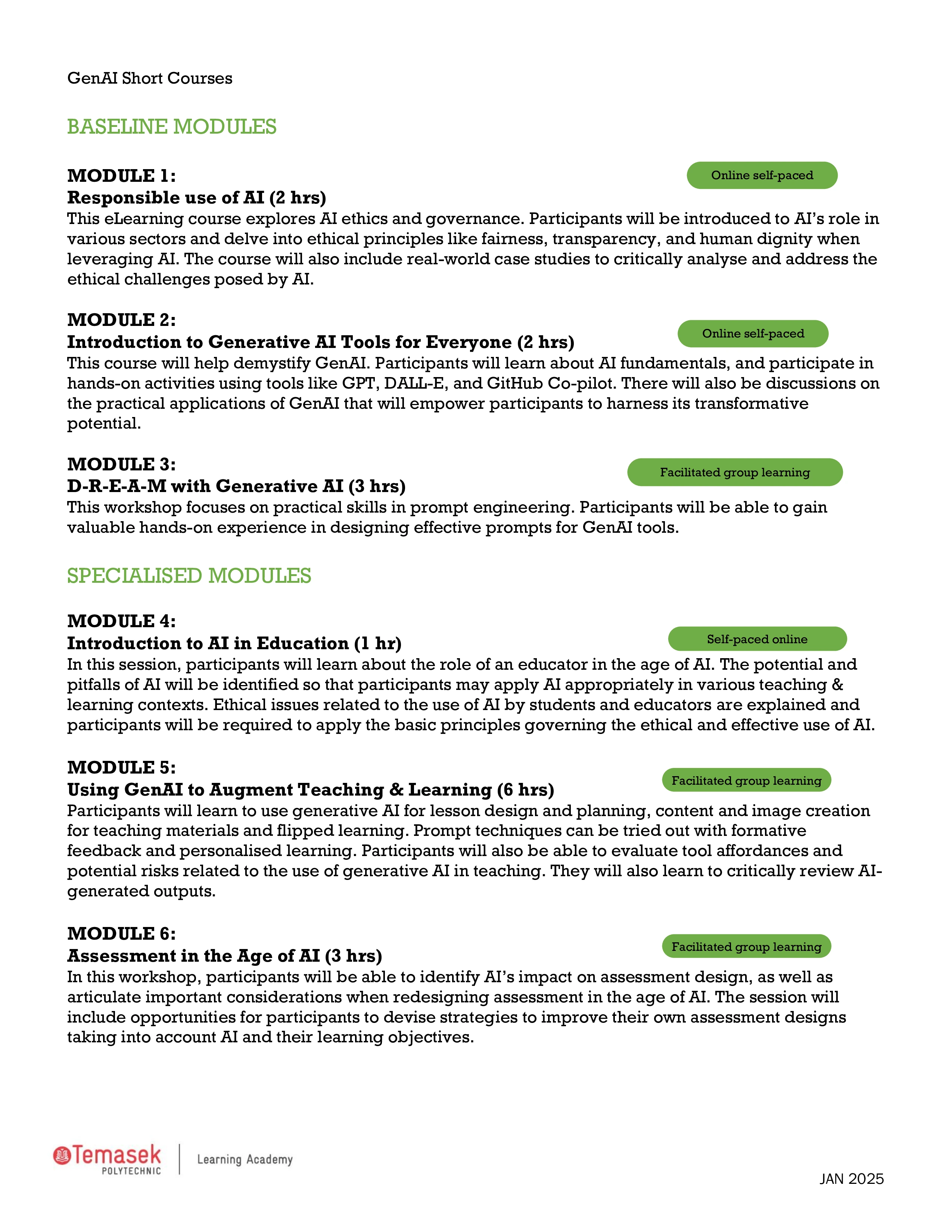
Certificate in Teaching & Learning for Polytechnic Educators (CTLPE)
Since 2019, all new lecturers to Temasek Polytechnic undergo their initial teacher training through the Certificate in Teaching & Learning for Polytechnic Educators (CTLPE). This is a joint-polytechnic programme for all polytechnic lectures, that has been co-developed and co-delivered by all the polytechnics.
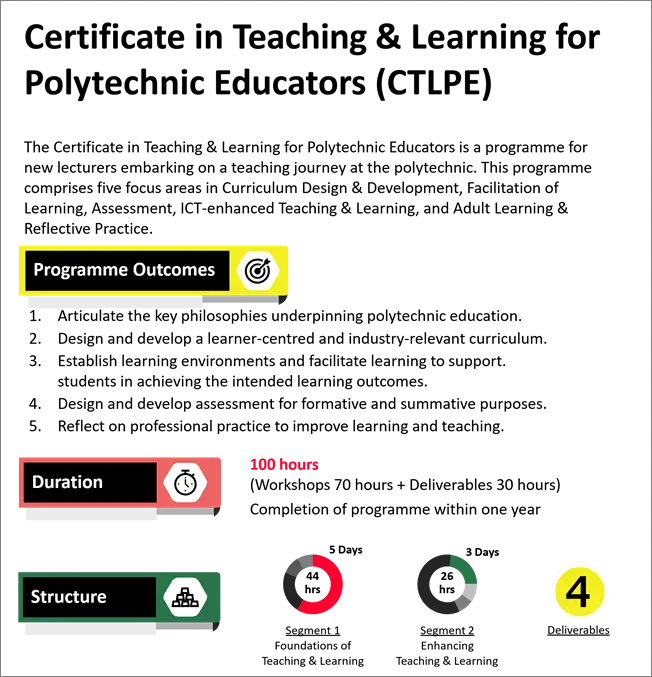
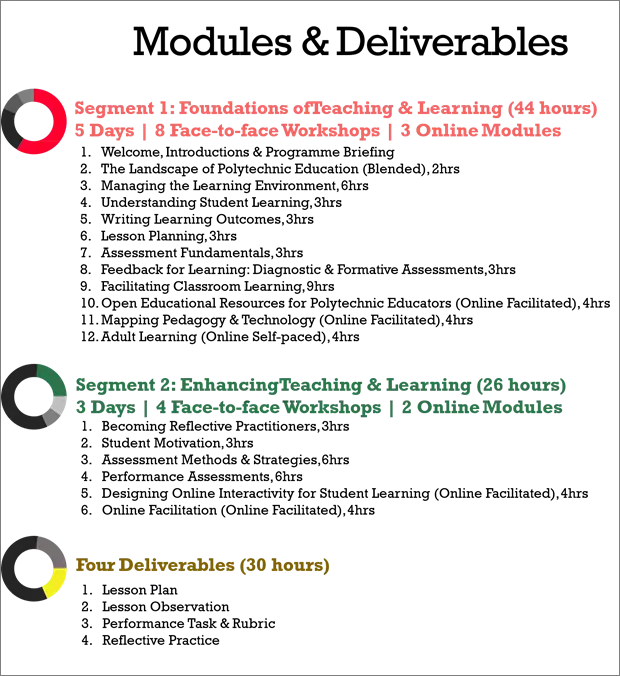
Educational Research
The Learning Academy aims to nurture a culture of research at TP by supporting staff in educational research and discussing contemporary higher education issues. We enhanced the staff’s academic research capabilities by promoting sound educational research methodology and practices.
We also help to provide information on educational research developments and promote effective use of research evidence to inform curriculum and learning-teaching practices. Staff are encouraged to undertake educational research through formal staff development programmes or projects.
In terms of funded educational research, three TP projects have successfully applied for the Ministry of Education’s Tertiary Education Fund (TRF). The fund aims to empower educators to improve teaching and learning practices based on research and data.
Conference presentations and publications
Staff from the Learning Academy regularly collaborate with colleagues from the Schools and Centres in TP to share their research through conference presentations and publications. The focal point of such synergistic collaboration is to research practice-based curricular interests core to polytechnic education. The research projects focus on different pedagogy areas, including developing self-directed learning, e-learning, facilitation, learning analytics, holistic education, and assessment.
Supporting Pedagogy@TP and Beyond
LA also supports TP in the implementation and fine-tuning of strategies and initiatives to support our students better. Some current focus areas include:
- Personalised learning : TP believes personalised learning is a critical need in today's education landscape. It addresses the diverse needs of learners, leverages technological advancements, prepares students for the dynamic job market, and promotes a culture of lifelong learning and adaptability.
- High tech, high touch: As part of TP’s vision for personlised learning, the polytechnic is working towards areas of personal coaching, mentorship and other forms of human interaction for customised support and guidance (also known as high touch), as well as leveraging AI and analytics for customised learning experiences, content delivery and learning support (high tech)
Joint-polytechnic Sector Teaching & Learning
LA contributes on behalf of TP for strengthening the T&L of the sector as a whole. As part of the Joint-polytechnic committee to enhance teaching & learning (JP-CETL) (established in 2013), TP provides inputs on strategic projects, and LA also supports the implementation and operationalisation of the resulting frameworks and programmes back in the polytechnic on the ground. Sectorial programmes that resulted from such strategic projects included frameworks and expectations for school and course leaders, as well as move-in programme for such leaders, in the form of the joint-polytechnic School Leadership Move-in Programme (SLMP), the Course Leadership Move-in Programme (CLMP), as well as the Teaching & Learning Mentors Move-in Programme (TLMP).
The sectorial staff development programmes are helmed by the Joint-Polytechnic Academy for Polytechnic Educators (JP-AcE)
Learning Academy’s Staff and Associates
The Learning Academy staff are experienced teachers and adult educators with professional qualifications and years of work experience in accountancy, business, communication skills, computer engineering, design, education, information technology, law, the life sciences, and the social sciences. This combination of expertise and knowledge makes them uniquely suited to help polytechnic lecturers translate their industry knowledge into quality learning-teaching.
The Learning Academy staff are committed to enhancing student learning through staff development programmes and initiatives. They guide lecturers in their work, supporting, assisting and providing pedagogical insights and advice as needed. Initiatives to strengthen TP’s pedagogical practices, such as taskforces, award schemes, curriculum review projects, mentoring and research projects, are also facilitated by the Learning Academy’s team of full-time staff.
Learning Academy Management
TP’s Academic Mentorship Model
In Temasek Polytechnic, Leading Academic Mentors (LAMs) (based at the Learning Academy) and Senior Academic Mentors (SAMs)(based in the Schools) lead in areas of pedagogy, research, innovation and mentoring. SAMs often work closely with LA in their work of pedagogical development.
Learning Academy Associates
Learning Academy Associates are lecturers from the various Schools and Academic Centres in TP who work in partnership with the Learning Academy. Based on the needs of the respective Schools/Centres, they contextualise Learning Academy’s professional development programmes and initiatives and help to facilitate the sharing of effective educational practices. Other areas of involvement may include facilitating selected programmes or conducting educational research.
President’s Award for Teachers
Administered by the Ministry of Education and the Academy of Singapore Teachers, the President’s Award for Teachers (PAT) gives national recognition to the critical role teachers play in moulding the future of our nation. These teachers prepare students for life, as well as model commitment to continuous learning and enterprise. They inspire both their students and peers through their words and deeds.
Please click here for a list of current PAT recipients.
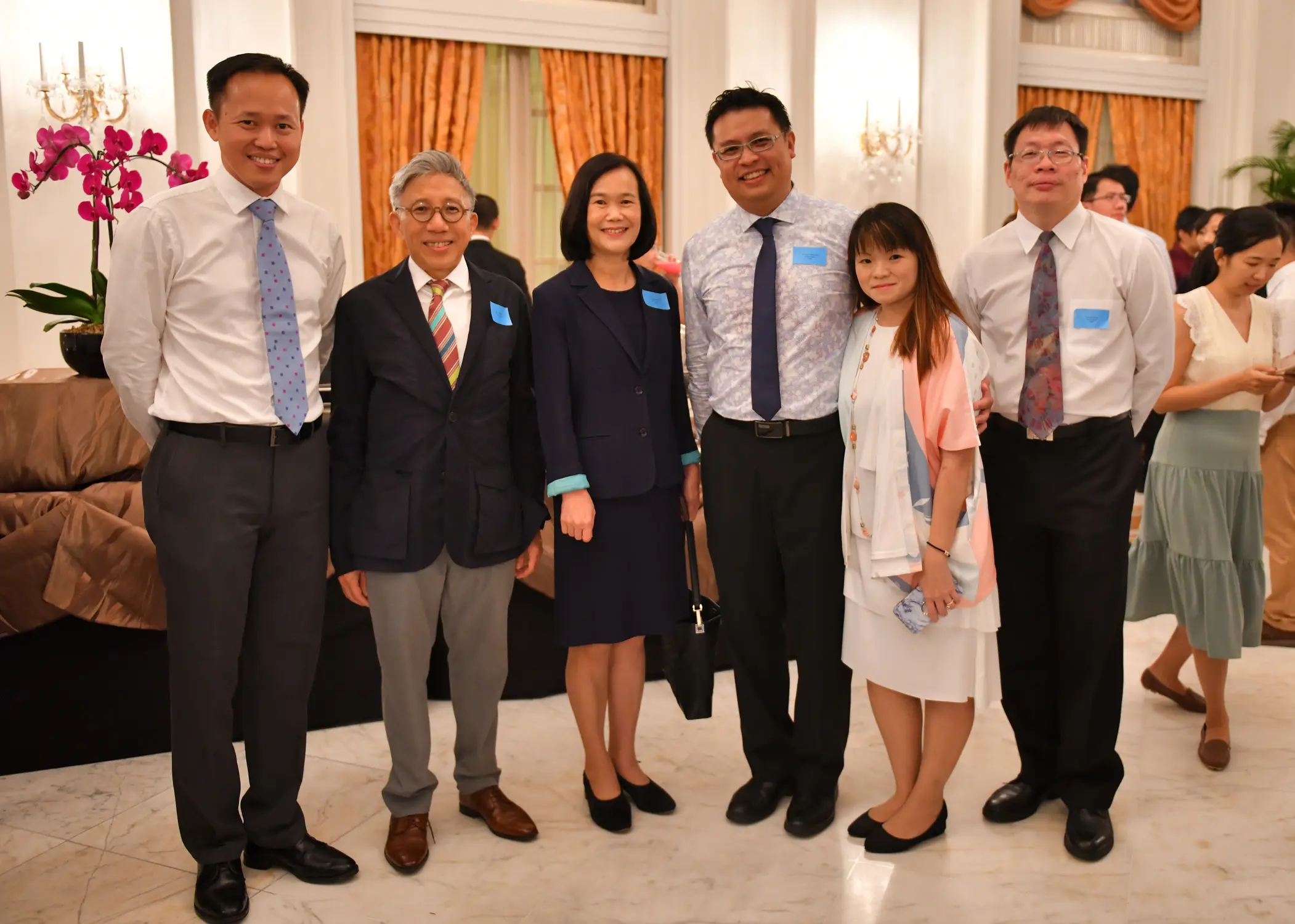
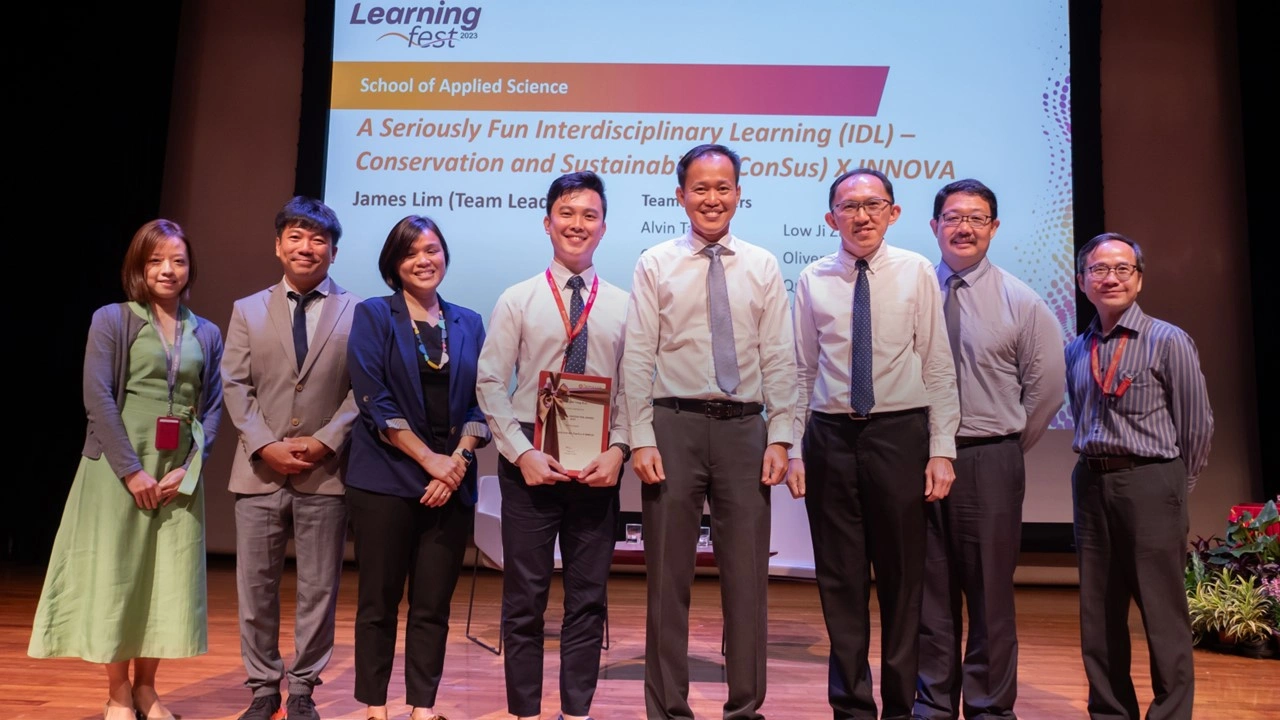
Educational Innovation Award
The Educational Innovation Award (EIA) acknowledges outstanding contributions toward enhancing student learning. It is awarded for acts, products, or approaches that define the creation and delivery of significantly different and innovative experiences which enhance student learning. It is hoped that the award will encourage replication and further development of innovation.
Please click here to see the latest teams of EIA recipients.
Teaching Excellence Award
The Teaching Excellence Award (TEA) recognises and motivates teaching staff who have demonstrated significant impact on student learning through their teaching practices. These award recipients who are exemplary in enhancing their students’ learning experience and development, also serve as role models for their colleagues.
Please click here for a list of current TEA recipients.
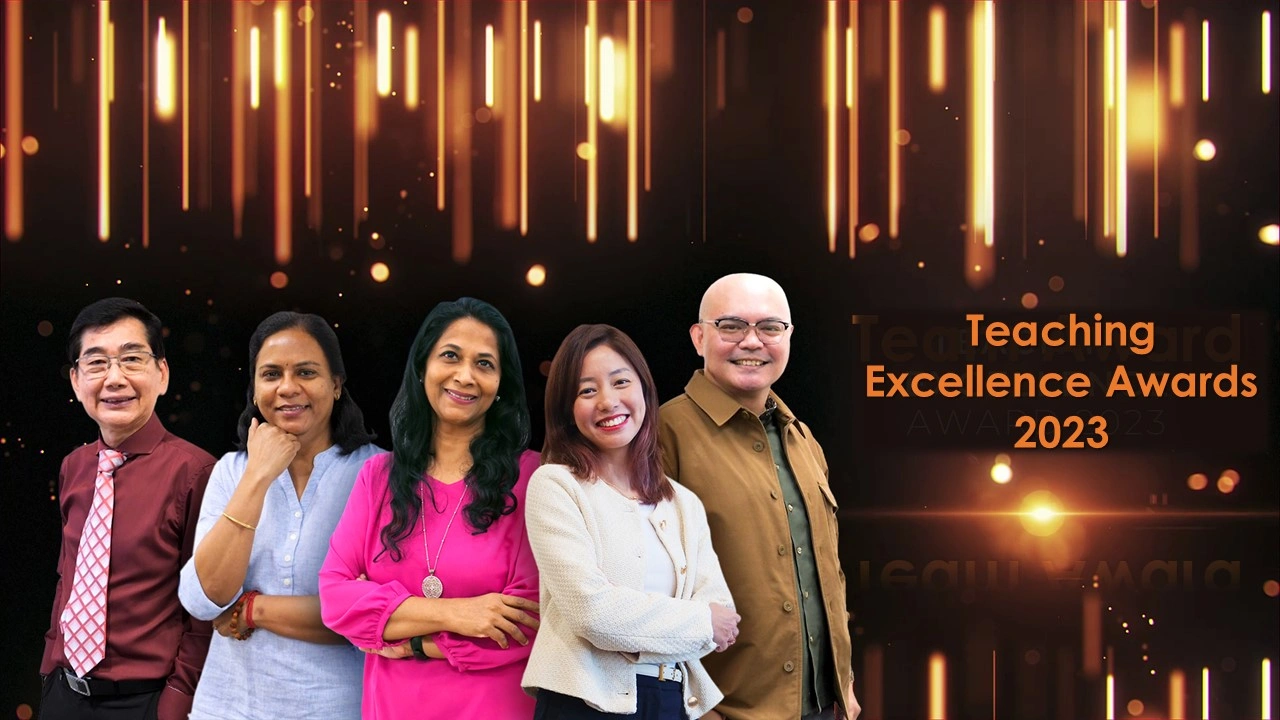
Contact Details
- learningacademy@tp.edu.sg
- 8.30 am to 6.00 pm (Mon to Thurs). 8.30 am to 5.30 pm (Fri) Closed on Sat, Sun & Public Holidays
-
Learning Academy
Temasek Polytechnic
Administrative Block 9
Lobby C, level 5
21 Tampines Avenue 1
Singapore 529757

